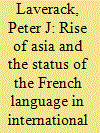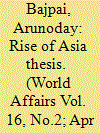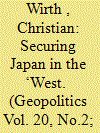|
|
|
Sort Order |
|
|
|
Items / Page
|
|
|
|
|
|
|
| Srl | Item |
| 1 |
ID:
141279


|
|
|
|
|
| Summary/Abstract |
This article examines how, in a global strategic context presided by the rise of Asia and the US rebalance towards that region, Europeans are contributing to transatlantic burden-sharing—whether individually or through the EU/NATO. As Asian powers reach westward and the US shifts its strategic priorities eastward, classical geostrategic delimitations become gradually tenuous. Particularly important are the ‘middle spaces’ of the Indian Ocean, central Asia and the Arctic, in that they constitute the main avenues of communication between the Asia–Pacific and the European neighbourhood. The article seeks to understand how evolving geostrategic dynamics in Europe, the ‘middle spaces’ and the Asia–Pacific relate to each other, and how they might impinge on discussions on transatlantic burden-sharing. It is argued that the ability of Europeans to contribute to a more equitable transatlantic burden-sharing revolves around two main tenets. First, by engaging in the ‘middle spaces’, Europe's key powers and institutions are helping to underpin a balance of power in these regions. Second, by stepping up their diplomatic and economic role in the Asia–Pacific, strengthening their security ties to (US) regional allies and maintaining an EU-wide arms embargo on China, Europeans are broadly complementing US efforts in that key region. There are a number of factors that stand in the way of a meaningful European engagement in the ‘middle spaces’ and the Asia–Pacific, including divergent security priorities among Europeans, the impact of budgetary austerity on European defence capabilities and a tendency to confine foreign policy to the immediate neighbourhood. The article discusses the implications of those obstacles and outlines some ways in which they might be overcome.
|
|
|
|
|
|
|
|
|
|
|
|
|
|
|
|
| 2 |
ID:
147090


|
|
|
|
|
| Summary/Abstract |
To what extent can we speak of a distinctively ‘European’ security approach towards the Asia-Pacific region? In order to address that timely question, this article examines how Britain, France, Germany and the European Union (EU) are framing their evolving security roles in the Asia-Pacific region, and how those individual perspectives intersect with each other. The article identifies a number of important common features in Europe’s approaches towards security in the Asia-Pacific, namely the tendency of most European actors to emphasize the economic and diplomatic nature of their contribution to regional security, their promotion of regional multilateral security fora, their rejection of the notion that China’s rise is inherently challenging for regional and global security, and their willingness to signal their differences towards Washington’s emphasis on military power and alliance-based approach. However, and despite the existence of common traits, individual European actors show different degrees of closeness vis-à-vis the US and China and feature different perspectives regarding which security relationships they should prioritize in the region (if any), or the appropriate balance between diplomacy and security and defence cooperation. Such divergences prevent Europeans from developing a coherent security profile in the region and preclude us from speaking of a distinctively European security approach towards the Asia-Pacific.
|
|
|
|
|
|
|
|
|
|
|
|
|
|
|
|
| 3 |
ID:
141486


|
|
|
|
|
| Summary/Abstract |
In the last century, French and English became entrenched as the two working languages of international law. Since that time, we have witnessed the rapid development and integration of Asian nations into international systems and the adoption of English as the sole universal language in other fields. This article carries out a cost-benefit analysis concerning the continued use of French in international law, in particular at the tribunals of international criminal law. The aim of this article is to assess whether the current bilingual system is fit for purpose in the 21st century. The mode of analysis is data, first showing the global use of languages today, and then regarding the make-up and workings of international courts, in particular the International Criminal Court. From this data, the author concludes that French is unfit for purpose as a common working language due to the bias that its use creates against Asian and Latin American nations. The author concludes that the only satisfactory solution is the abandonment of French in favour of a system that uses English as the sole common working language.
|
|
|
|
|
|
|
|
|
|
|
|
|
|
|
|
| 4 |
ID:
118930


|
|
|
| 5 |
ID:
138978


|
|
|
|
|
| Summary/Abstract |
Why has the military dimension of the US-Japan relationship remained the central point of reference for Japanese foreign relations, despite the demise of the Soviet Union? Why has Japan, deepening economic interdependence notwithstanding, remained politically distant from East Asia? Based on analysis of statements by Japanese and US political elites and academics regarding the US-Japan alliance, this article argues that the rise of China, coterminous with the rise of ‘Asia’, challenges the notion of the ‘West’ as, according to standards of industrial modernity, a superior social and political order. These moving ideational boundaries question Japan’s position as the most advanced Asian nation and member of the (Western) international society of states. Therefore, the US-Japan alliance has since the mid-1990s become increasingly important for securing Japan in the ‘West’ and the ‘West’s boundaries in East Asia.
|
|
|
|
|
|
|
|
|
|
|
|
|
|
|
|
|
|
|
|
|